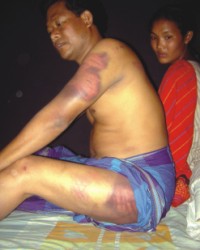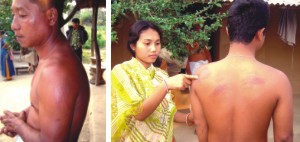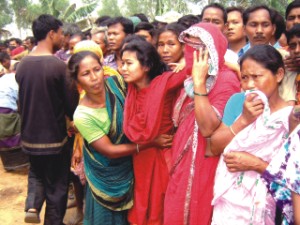|
Human Rights
The Price of Protest
Staff Correspondent
 |
Choles Ritchil |
On March 18, 2007 Choles Ritchil, the popular and very outspoken Garo leader from Modhupur in Tangail district was arrested in Kalibari Bazar while returning from a wedding. While in the custody of the army this healthy, 41-year-old man died that very day bearing marks of severe torture all over his body. Two conflicting statements were received from government spokespersons one was that he had died of a heart attack and the other was that he had died trying to run away from his captors. An unnatural death (UD) case was filed but when Sandha Rani Simsang, Choles' 28-year-old wife went to register an FIR (First Information Report), it was refused by Officers at the Police Station who said that a UD case had already been filed and an FIR was unnecessary. An autopsy was apparently carried out at the Tangail Sadar Hospital but the report has yet to see the light of day.
 |
Protap Jambil was allegedly tortured by the joint forces along with
Choles Ritchil. |
Asian Centre for Human Rights (ACHR) made an appeal to the heads of the delegations participating in the 14th SAARC Summit to request registration of an FIR and order a judicial inquiry into the killing and cancelling of the Eco-park project in Modhupur, among other things. NGOs Odhikar, Ain o Salish Kendro (ASK), Bangladesh Environmental Lawyers Association (BELA), Bangladesh Legal Aid and Services Trust (BLAST), Association for Land Reform and Development (ALRD), Forum of Environmental Journalists of Bangladesh (FEJB), Centre for Sustainable Development (CFSD) and Nijera Kori have been closely following the case and stressed on the registration of an FIR, which is said to be the first step to ensuring justice.
There is no such thing as a clean crime and Choles Ritchil's death was far from clean. There were conflicts and controversies from the very beginning like the marks on his body, the rejection of the FIR, the absence of an autopsy report even four weeks after his death and the lack of any progress in a case so highlighted in the media (a special feature on the Star Weekend Magazine on March 30, 2007 drew attention to the corruption within the forest department officials and the army and how Choles' fight against a scam under the name of an eco-park made him very powerful and furious enemies).
According to ASK soon after the incident, the person who arrested Choles, along with his troops and some forest department officials were transferred from Modhupur. Fortunately for Ritchil and his family, there were eyewitnesses to his death. Three of Choles' com-panions, 40-year-old Protap Jambil, 38-year-old Piren Simsang and his son 22-year-old Tuhin Hadima were also taken along with him from the microbus they were travelling in.
 |
Tuhin Hadima (left) and his son Piren Simsang bore torture marks on their bodies. |
According to a statement given to ASK by Protap Jambil from his hospital bed in Mymensingh Medical College Hospital: Members of the combined military forces dressed in plainclothes took Choles and three of the others forcefully from their rented car into their pickup. Choles and Protap were taken to adjoining rooms at the army camp in Kakraid farm. They were both beaten up inhumanely. Choles was asked where he kept his firearms and he answered that he only had a licensed shotgun and he had deposited it to the Modhupur Police Station. But they continued to beat him up. An army doctor was called when blood started coming out from his nose and mouth. After some time Protap Jambil was set free by the army officer and his men.
According to Piren Simsang's statement to ASK: when they were returning from Mymensingh the driver of the hired car kept talking to someone on his cell phone and giving their whereabouts. When he was asked whom he was speaking to, he made up something about his next customers wanting to know when he will be available. In Kalibari the driver suddenly slowed down and a plainclothes army officer stuck a pistol to Choles' head and everyone was taken to their pick up and blindfolded. When the blindfolds were taken off it was very easy for them to recognise the Kakraid Army Camp as it was very close to their house. The army personnel made racist comments about the adibashis and started beating them up. Simsang, in his statement added that since there was only a wooden partition between the rooms Choles and the others were kept they heard everything that was said on the other side. The army personnel shouted out orders to bring different tools like pliers and needles to torture Choles with. In the evening Piren and his son Tuhin were set free.
 |
Choles Ritchil's family and the Garo community want a proper investigation into the incident that took place on March 18, 2007. |
On March 19, 2007 when a representative group from different human rights groups met the police superintendent and assistant police superintendent at Modhupur station, they said that Choles Ritchil was involved with terrorist activities and had a warrant for his arrest. When asked about the circumstances of his death they refused to comment. They acknowledged that an autopsy had been carried out but refused to talk about what it had revealed.
Md. Nur Khan, the Director of the Investigation and Documentation Unit of Ain o Salish Kendro was one of the representatives of the investigation by the human rights groups. “Although the duty officer at the police station received and signed the FIR (a copy of the signed FIR is available) on March 20, 2007, the FIR was never registered and that is delaying the whole proceedings,” says Khan, “in cases involving the law-enforcing agencies or the joint forces there is a certain amount of tardiness in the whole case.”
Khan thinks that the claim the authorities are making about how he had a heart attack and fell and died when he tried to run from the army contradicts completely with the torture marks on his body. All these contradictions are making the locals (of Beribaid, Choles' neighbourhood) doubt whether they will ever see a conviction in this case, and whether justice will ever be served. “As a result, the confidence that the common people were gaining on the government in recent days that even people in power were not above the law, will be lost,” says Khan, “from the evidence available, it is clear to us that the death occurred because of severe torture that was inflicted on him while in custody but the district magistrate [of Tangail] said that he sent two magistrates and they said that they saw no such marks on his body.”
Khan says that the transfer of the army officer who allegedly led the torture and his cohorts doesn't really help. “In such a situation it's not good enough to withdraw the suspect from his position. Under the current emergency situation, he should be suspended from the army and a proper investigation carried out which should be transparent, impartial and independent,” adds Khan, “we want the army to take an initiative themselves and carry out an enquiry in order to keep the discipline within the army and gain the trust of the people.”
The security of Protap Jambil, the main eyewitness to the incident is now a big question and he is believed to be either hiding in fear of further persecution. Drishtipat, the online human rights organisation is trying to raise funds to help Protap Jambil and his family.
Choles Ritchil was an admired and uncompromising leader of the Garo community in Modhupur. From the very beginning of the controversial Eco-park project, which threatened to take away the land and livelihoods of the adibashis, his outspoken protests made some forest officials very unhappy. Every time corrupt forest officials who bribed to get a position in Modhupur, tried to cut down trees to sell them off for personal profit, he pounced on them to protect his homeland and the ultimate ecological balance of the country. For these actions cases upon cases were filed against him and the disadvantaged forest officials and army personnel secretly waited for revenge.
And they got it on March 18. Thousands of mourners attended the memorial service of Choles Ritchil, their favourite leader. Black flags were set up atop all the houses of adibashis. And now the people want justice. By arresting high profile political leaders the interim government has proven that they mean business in their fight against crime and corruption and no one is above the law. An incident like this can seriously mar the government's current drive. If the operations of the army are not transparent then the general conclusion will be that a certain section, whether it's the powerful political party in power or the law-enforcing agency, will always remain above the law. In a democratic country, it is completely unacceptable that a person should die during an interrogation under the custody of law enforcing agencies.
Photos: Bangladesh Forum for indigenous people
Copyright (R) thedailystar.net 2007 |
